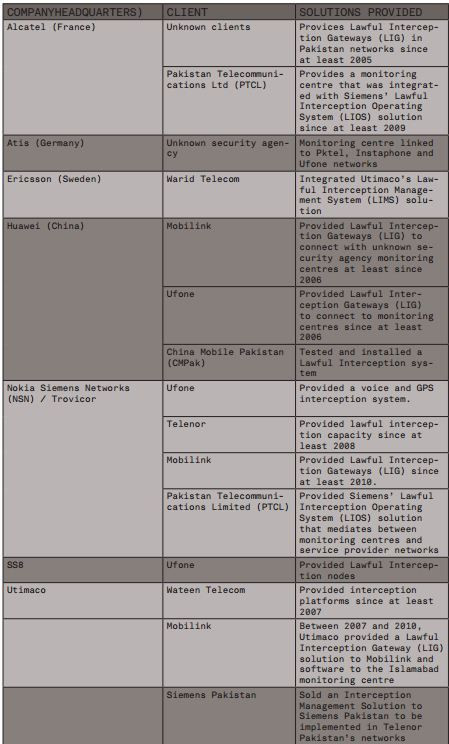Pakistan Building Global Internet Surveillance To Rival NSA: Report

Pakistan's intelligence agency has been trying to build a sophisticated spying network that would rival the U.S. National Security Agency (NSA) in its scope, recording the phone calls and Internet data of hundreds of millions of people worldwide, according to a new report.
The report, published this week by U.K.-based firm Privacy International said that Pakistan's Inter-Services Intelligence (ISI) tried to tap on global Internet traffic through undersea cables, and that it had contracted intermediary companies to buy spying toolkits from Chinese and Western firms for domestic surveillance. The network it sought to create, the report warned, "would rival some of the world's most powerful surveillance programs," including those of the U.S. and the U.K.
Pakistan, which has a long history of suppressing activism and political dissent, was already a third-party provider to the NSA's surveillance network, but the report said that the Asian country is now developing its own software and infrastructure that would not be reliant on the U.S.
According to the report, the ISI sought access to data from three of four Internet "landing sites" that pass through the port city of Karachi, allowing it to monitor Internet traffic from across the world. Pakistan was in talks with an unnamed European company in 2013 in order to acquire the necessary technology, but it is unclear whether the deal went through, Privacy International said in the report.
"These cables are going to route data through various countries and regions," Matthew Rice, an advocacy officer for Privacy International, told the Guardian on Thursday. "Some will go from Europe to Africa and all the way to south-east Asia. From my reading that's an explicit attempt to look at what's going on."
Pakistan already has a significant infrastructure for domestic surveillance, having purchased technology from U.S.-based Blue Coat and U.K.-based Finfisher. Other companies named in the report include Ericsson, Alcatel, Huawei, SS8 and Utimaco.

A recent breach of Italy-based Hacking Team also revealed that the controversial software provider, which has become notorious for supplying authoritarian regimes with surveillance tools, was also in talks with the ISI.
The report pointed out that Pakistan is a highly networked country, with over 70 percent of the population using mobile phones and about 11 percent using the Internet, generating huge amounts of communications traffic for the country's intelligence to monitor.
"Surveillance across all of Pakistan's networks is becoming more widespread," the report warned, stating that the Pakistan Internet Exchange -- a unified Internet infrastructure that prevented most of the country's traffic from leaving domestic borders -- was highly vulnerable to interception.
Privacy International said the report was based on previously unpublished documents.
Pakistan is currently debating its own cybercrime prevention bill, which human rights groups have slammed, warning that it would curtail free speech and hamper privacy.
"The Prevention of Electronic Crimes Act bill neither protects the public from legitimate online security concerns nor respects fundamental human rights," Phelim Kine, Asia division deputy director at Human Rights Watch, said in April. "In its present form, Pakistan's cybercrime prevention bill will instead institutionalize unacceptable violations of basic rights with a thin veneer of legality."
© Copyright IBTimes 2024. All rights reserved.





















